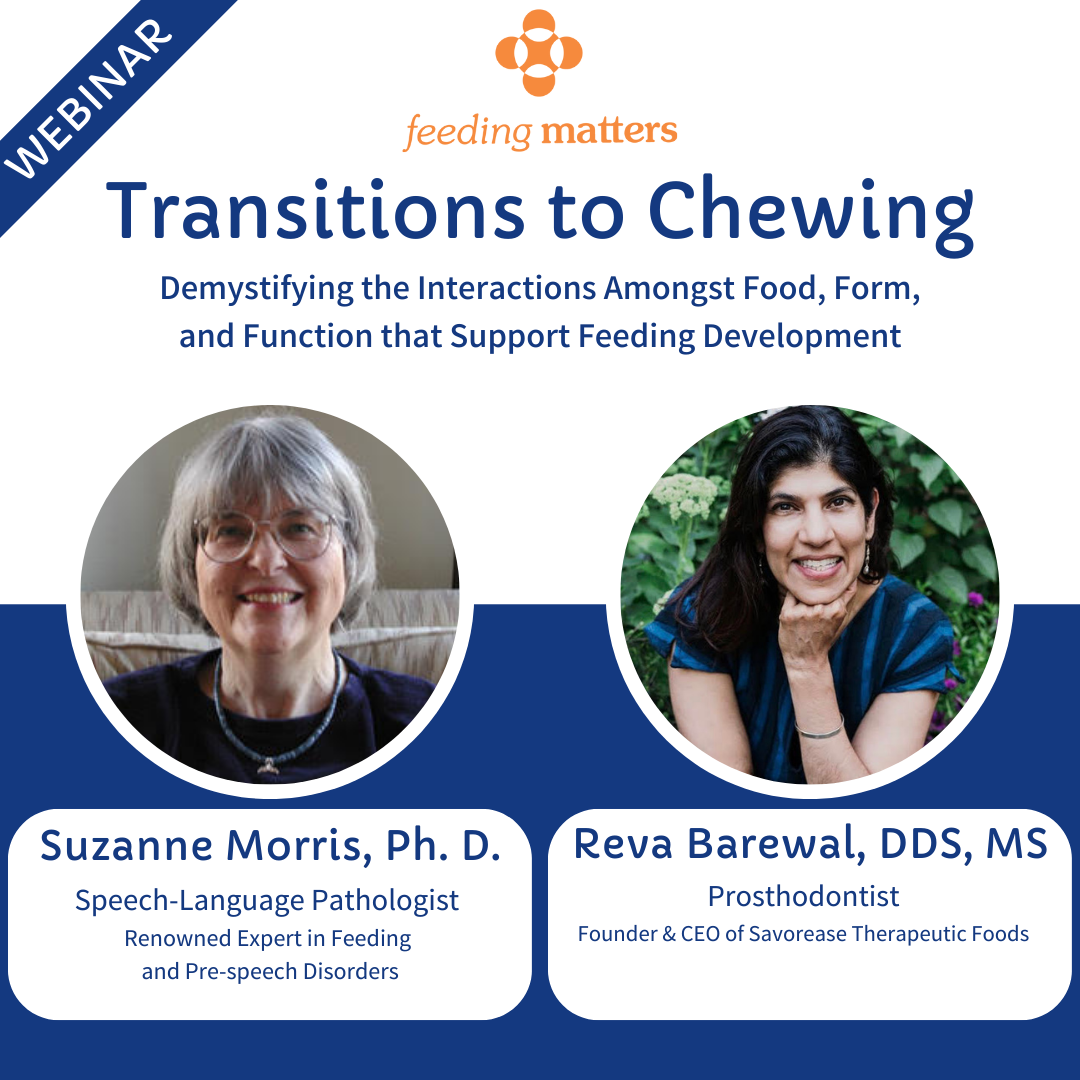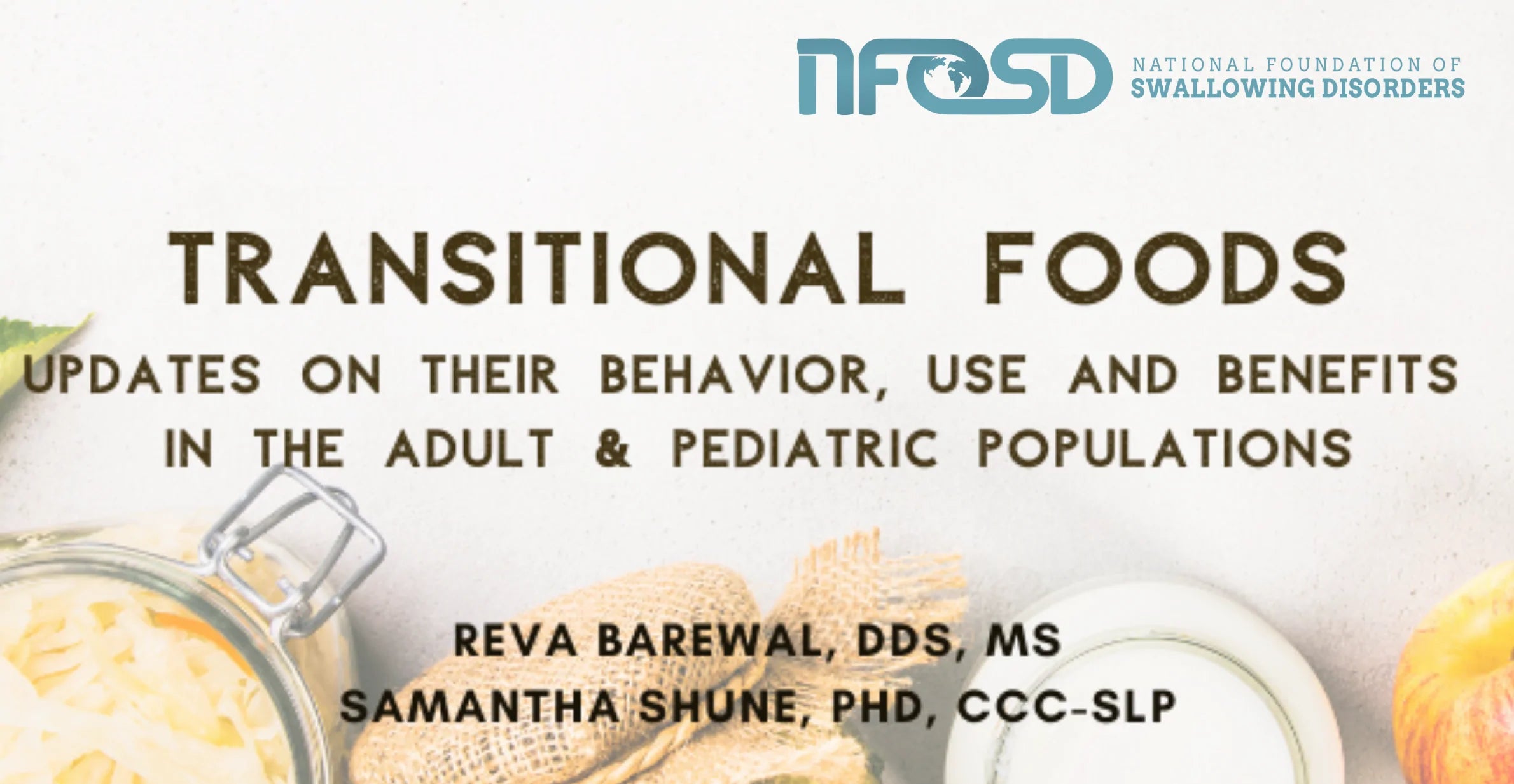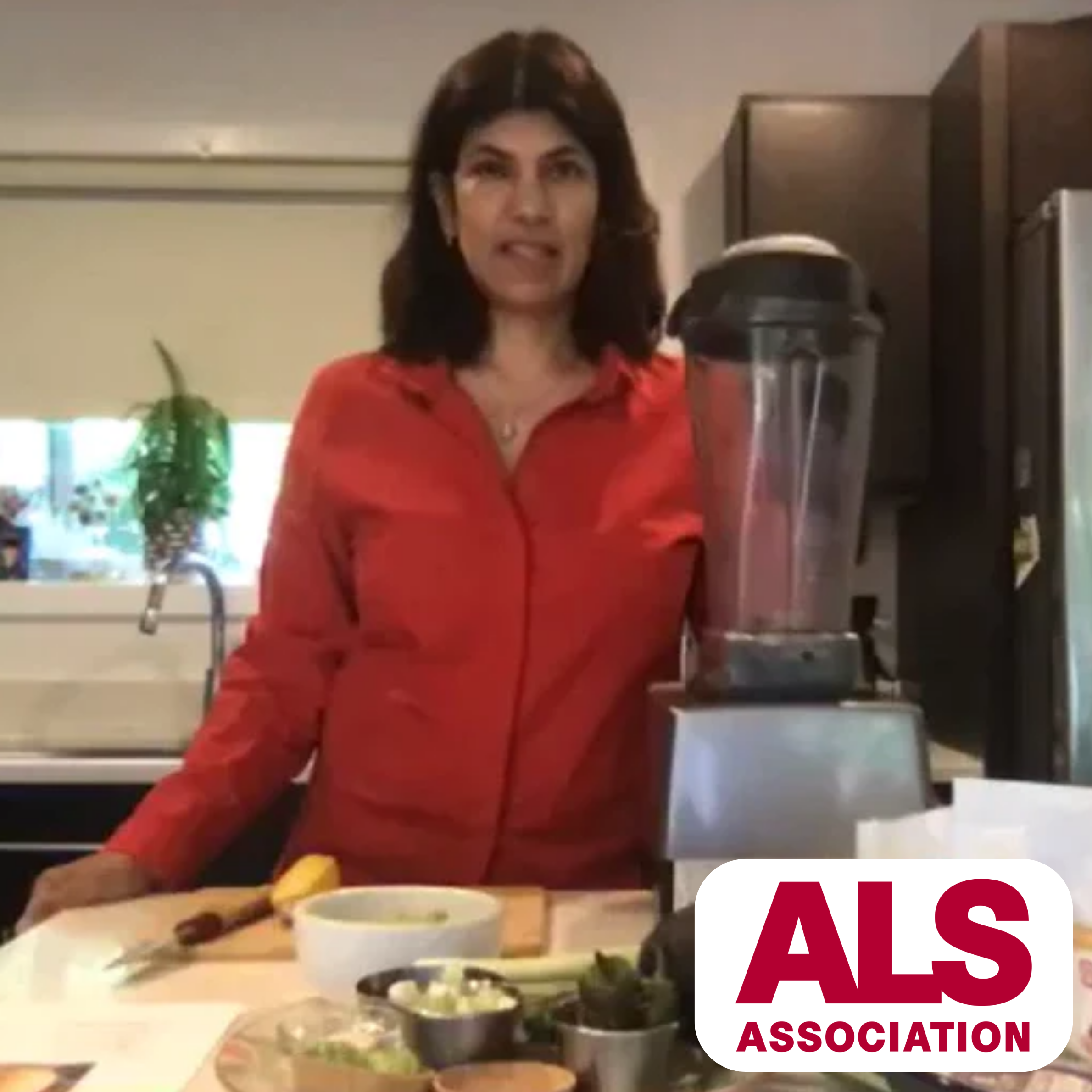Podcasts
&
Webinars
Enjoy a collection of recorded educational talks that are available for viewing and/or listening. Learn about transitional foods from our expert, Dr. Reva Barewal.

WEBINAR | FEEDING MATTERS
Transitions to Chewing: Demystifying the Interactions Amongst Food, Form, and Function that Support Feeding Development
When infants and children experience a pediatric feeding disorder there is a major interaction between developmental pre-feeding skills, the child’s comfort with the sensory aspects of transitional foods, and the interactive role of the structures of the mouth. The interplay among these features strongly influences the abilities and limitations that the child experiences during feeding. Speakers will discuss the sensorimotor journey, how to advance skills, mouthing, transitional foods, dissolvable solids, examine specific dissolution patterns, and further examine the vast and intricate interplay that affects children with pediatric feeding disorder.

PRESENTATION | NFOSD
Meet the Makers Featuring Dr. Reva Barewal
"Meet the Makers" features industry leaders sharing how their products can be best utilized to help manage and treat swallowing disorders.
On this presentation, you will learn:
- The purpose of dissolvable solids for swallowing and feeding disorders
- The unique mouth behavior of Savorease dissolvable solids
- The features of our crispy melts that help solve some of the biggest challenges in nutrition for swallowing and feeding disorders.

PODCAST | The Meaningful Marketplace
You Don't Have to Chew to Swallow
In conversation with Sarah Masoni and Sarah Marshall from The Meaningful Marketplace Podcast, Dr. Reva tells her journey which led to the creation of Savorease Therapeutic Foods. Click here to listen to the full story.

PRESENTATION | Speechtherapypd
Functional Approaches to Evaluation and Treatment of PFDs
In this 4 hour course, a panel of presenters will share ideas on how to collaborate with care team members to help their clients reach their most potential.
Topics of discussion will include the Importance of Transitional Foods, the vitality of Occupational Therapy for pediatric feeding, and the benefits of bringing the blender to the tube.
Finally, the last hour will be spent looking at two case studies with the presenters working through evidence based practice of assessment and treatment for hypothetical individual with a dual diagnosis of Down syndrome and Autism Spectrum Disorder, as well as a second hypothetical case of an individual with Spastic Cerebral Palsy and a Seizure Disorder.

WEBINAR | NFOSD
Transitional Foods - Updates on Their Behavior, Use and Benefits in both the Adult and Pediatric Populations
National Foundation of Swallowing Disorders (NFOSD) invited guest speakers, Dr. Reva and Dr. Samantha Shune to help demystify transitional foods - especially solid foods that dissolve in the mouth to softer textures.
Learner Outcomes:
1. Understand the difference between transitional food behaviors in the mouth in comparison to IDDSI benchtop methods.
2. Classification of transitional foods and the importance of the oral environment.
3. Learn the role transitional foods can play in dysphagia management

PODCAST | SPEECH UNCENSORED
Demystifying Transitional Foods - What is a True Meltable Snack?
How do you move from discovering a problem on patients face to developing an innovative solution? The pattern of innovation, deeply rooted in collaboration across disciplines will be explored. The innovation stemmed from an understanding of the change in the dining experience for someone with dysphagia and their caregiver. We will focus on snack time as an opportunity to re-create the slow grazing behaviors that can lead to increased nutrition.

WEBINAR | ALS ASSOCIATION
Summer Fiesta: Cooking with Texture and Taste
Yay Summertime! When it is the peak of the heat, it is important to stay hydrated and not forget to eat.
Join Dr. Reva and Cassy from the The ALS Association Oregon and SW Washington Chapter as they whip up a delicious piña colada, and guacamole.
These calorie rich recipes are also perfect thickness for a safer swallow. Served up with our delicious crackers and Cuban black bean dip, we had a perfect fiesta that has finger foods and drinks for people with dysphagia that everyone will enjoy!
Also testing of your food for the right thickness to suit a softer diet will be demystified to ensure the home chef knows exactly the consistency they are serving up.

PRESENTATION | ALS association
Dining Health: How you eat, When you eat and Who you eat with
Dining health refers to the environment we create to improve the eating experience. Where we eat, with whom we eat, and when we eat might be equally if not MORE important in determining how much we eat and which foods we eat than the food itself.
Food is a necessity for survival. But our association with food is complex and deeply rooted in family history and culture. Food is how many of us show love. It can be a creative expression. It can symbolize the change of seasons. It can be tied to our religion or our beliefs. It becomes our identity. Food has more meaning than the nutrition. With changes in swallowing that may happen with ALS, the conversation stems from worry about losing weight. But we don’t eat nutrition, we eat food. If we can return the conversation back to food enjoyment, and the dining experience, the desire to eat can be improved.
These are ideas that you can pull out when needed. This is not a complete “recipe” but tips that will help and provide ideas to make some positive memories out of dining experiences.

PODCAST | THE FIRST BITE
Savoring the Science behind that “First Bite”
Dr. Reva was honored to be a guest on First Bite: A Speech Therapy Podcast hosted by Michelle Dawson, MS, CCC-SLP, CLC. First Bite is an educational resource for SLP's with Michelle offering her own unique insights while interviewing colleagues that are experts in their respective fields. In this episode, Dr. Reva Dr. Reva speaks with Michelle about How the dissolvability of a food impacts a patient’s bite/chew pattern, 3 different ways in which “taste” and “crunch” impact a patient’s desire to eat, and positive outcomes of following the IDDSI diet when considering solids and purees. Click here to listen!

WEBINAR | SPEECHTHERAPYPD
Interdisciplinary Approach to Dysphagia Management in Adults
Eating is a fundamental daily task that encompasses not only food consumption, but also social interaction, cultural rituals, and shared values. Swallowing is not an isolated action; the disability resulting from dysphagia reflects the complex interactions between individuals and their environment. This conference will focus on the interdisciplinary approach to dysphagia management in adults by discussing biopsychosocial considerations, texture preference and the impact of a modified texture diet on our emotional, psychosocial and physical state, the changes in food sensory stimulation in older patients, and learn about the new Dietary Guidelines for Americans and how these concepts can be used in tube feeding patients.

WEBINAR | SPEECHTHERAPYPD
Finding the Right Fit: Transitional Foods and Texture Preferences in PFD
Transitioning to a solid diet is an important milestone in a child's journey. Learning mastication and bolus control for a child with a pediatric feeding disorder is dependent on the experience of the practitioner, the input and compliance of the family with recommendations, and the availability of the right foods to safely, effectively, and confidently advance a child’s diet. This course is designed to create a solid foundation for clinicians on the intricacy of transitional foods.
PODCAST | THE FOUR TOP
Episode 61: Reva Barewal | Alexis Hillyard | Drew Prindle
On this episode, Dr. Reva Barewal along with Alexis Hillyard, who is the talent behind Stump Kitchen, a vegan and gluten-free YouTube series and website that celebrate body diversity, and Drew Prindle, who is a senior editor at Digital Trends, is an expert on the future of food, celebrate the ways in which technology and innovation have made cooking and eating increasingly accessible to those with disabilities


PRESENTATION | SPEECHTHERAPYPD
Transitional Foods: Behavior, Benefits and Use to Improve Texture Modified Diets
What are transitional foods? We will explore the growing scientific evidence on uses, benefits and limitations for adult and pediatric patients with dysphagia. The IDDSI testing method will be contrasted with observed dissolution patterns in the mouth. Expanding our knowledge of transitional foods will provide a more person-centered approach in management of the texture modified diet

WEBINAR | SPEECHTHERAPYPD
Demystifying Transitional Foods: What is a True Meltable Snack?
How do we move from discovering a problem our patients face to developing an innovative solution? The pattern of innovation, deeply rooted in collaboration across disciplines will be explored. The innovation stemmed from an understanding of the change in the dining experience for someone with dysphagia and their caregiver. The webinar will focus on snack time as an opportunity to re-create the slow grazing behaviors that can lead to increased nutrition.
PODCAST | Swallow your pride
Chew on This: Dining Health & Dysphagia
Dr. Reva Barewal had a nice time on the Swallow Your Pride Podcast with Theresa Richard, M.A. CCC-SLP, BCS-S talking about mastication, dysphagia, transitional food science, the psychosocial implications of dysphagia and more!
Click here and checkout the podcast episode and Theresa’s work.


WEBINAR | ALS ASSOCIATION
Dining Health: The ALS Association Oregon and SW Washington Chapter
Cassy Adams, Care Services Director of The ALS Association Oregon and SW Washington Chapter, discussed dining health for people living with ALS with Reva Barewal, DDS, MS, Dip ABDSM. This document: http://alsoregon.org/dining will be referred to throughout the discussion and is a useful resource.

PRESENTATION | ASHA CONFERENCE
Transitional Food and IDDSI Definitions
Many people gradually migrate to a softer diet with loss of teeth, dental pain, or ill-fitting prosthetics. Dental implants are often the best solution we have to regain a regular diet. However, many times, we need to place our patients on a soft diet during the early healing period. But what do we know of the consequences of a softer diet? Are all the negative effects reversible with regained function? Join Dr. Barewal as she explores how masticatory function impacts the swallow reflex, brain health, and food enjoyment for individuals. Novel transitional foods will be discussed that help reduce the burden of a soft diet, may improve soft texture compliance post-surgically and overall health outcomes.
